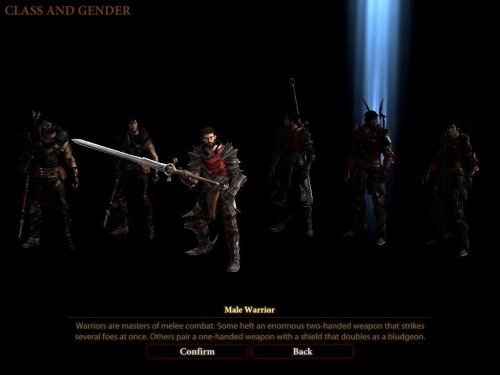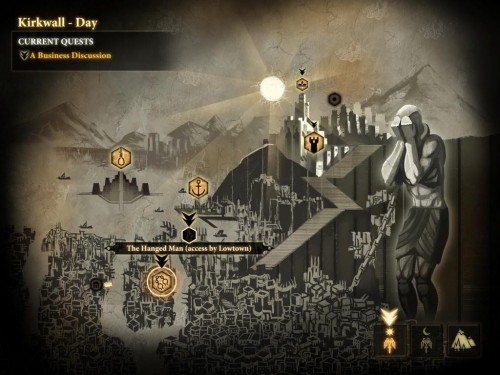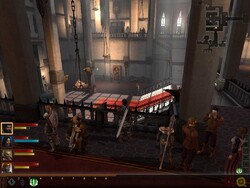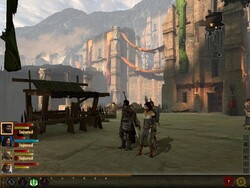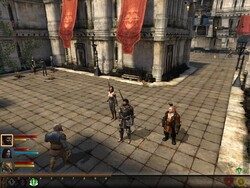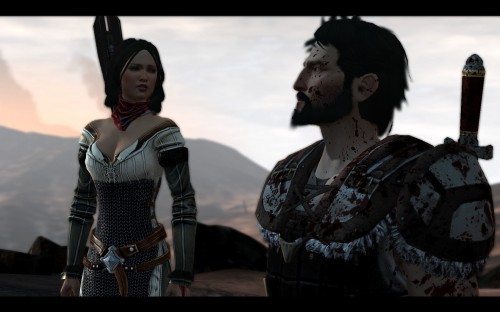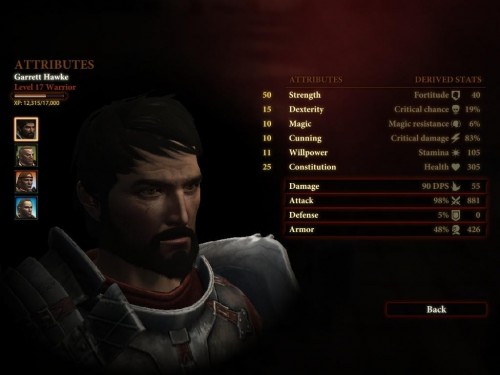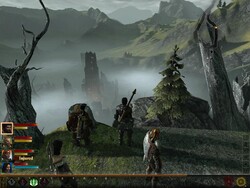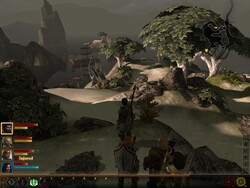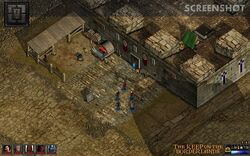Vault Dweller Does Dragon Age II
Vault Dweller Does Dragon Age II
Review - posted by VentilatorOfDoom on Thu 24 March 2011, 20:23:08
Tags: BioWare; Dragon Age II"Slam Dunk - a project that could be finished relatively quickly, with very little to no risk of it getting done on time.” Feargus Urquhart, a slam dunk enthusiast.
When Dragon Age was announced in 2004, many people were excited at the promise of a lavish new Bioware epic. Unfortunately, fans had to be patient as the game was only released 5 years later, in 2009.
Luckily, Dragon Age 2 was announced shortly thereafter and released little more than a year after the original. Lucky, that is, unless you’re bad at math and were expecting a proper sequel in one fifth the time. But conventional wisdom teaches us that when life gives you lemons, you should go and make some goddamn lemonade instead of whining about them lemons. So, who’s thirsty?
“EA really wanted to capitalize on the success of Origins, so the game was really being pushed hard to be released now.” Inon Zur, a professional train wreck watcher.
“Having a comparatively short developement cycle means that we either had to work faster and/or on a smaller scale. Faster was already a given, what with time being inexorable and linear and all, but a smaller scale means sacrifices, compromises, and cuts compared to the original, gigantic, epic game.” Stanley Woo, Captain Obvious.
The Setting & Story
The game takes place in and around Kirkwall, the capital of Orkney, part-timing as the City of Chains in Ferelden. You take on the role of Hawke (wouldn’t be a role-playing game otherwise), also known as the Champion, a human fighter/mage/rogue thoroughly infused with the element of awesome.
“Is it viable to have a game that's closer to Baldur's Gate 2 in terms of the raw mechanics and execution? I don't think there's anything preventing it. However, I do think that, as a genre, if RPGs can't evolve and can't change -- and I know people yell at me for daring to use the word "evolve" -- but if they can't change or experiment, then the genre itself is going to stagnate.” Mike Laidlaw, after giving a practical demonstration of how to evolve Baldur’s Gate 2 into Icewind Dale 2.
Hawke starts the game as a refugee fleeing Lothering with his mother and two siblings, a humble beginning (except the game makes clear from the start that you’re destined to be the most awesome dude ever). During the game’s numerous trials and tribulations, Hawke manages to save everyone but his family, losing them one after the other in a series of unfortunate scripted events. I assume that we were expected to care and maybe even shed a tear during Hawke’s emotional speeches, which take place between frequently scheduled bouts of asskicking, but action RPGs probably aren't a good medium to explore the tragic loss of loved ones you’ve only just met. Or maybe it's the fact that it's hard to care about the plight of the insipid characters Bioware saddles you with as siblings.
The main theme of the game is the brewing conflict between mages and the Templars, a military organization created to keep said magic-wielders in check. In the Dragon Age world, mages are way too dangerous to just let prance around freely like they do in most RPGs. Well, not unless they're bros with the player character, of course. You can have an entire party of apostate mages accompany you, melting faces and casting blood magic wherever you go, and no one will bat an eyelid. But I suppose you can't blame the NPCs for not wanting to mess with the once and future Champion of Kirkwall, can you? You can hear them whispering as you go by.
"Don't mess with that dude, he presses a button and something awesome happens."
Back to the story, mages draw power from a “metaphysical” realm, the Warp, I mean the Fade, which exposes them to the dangerous emo spirits populating it. These emo spirits, called demons in the game, try to possess mages and wreak havoc in the real world. So, if a mage isn’t strong enough to resist, Bad Things Happen.
Since relying on mages to be strong enough to resist is kind of like relying on EA to resist the temptation to shut down studios, the Circle of Magi was created to train mages properly in the arts of self control and meek obedience. When a mage in training completes the program, he or she takes a test where they attempt to fight that demonic possession in a “controlled environment”. Meaning that the Templars hack anyone who fails the test to abomination-bits.
So, while in Kirkwall, you’ll constantly run into Templars, Circle mages, apostates (renegade mages), and new mages who are just discovering their powers and trying to work out what to do about them. The conflict is fairly well presented – it’s one of the few strengths of the game - and many characters you’ll meet will help you look at the situation from different points of view.
As you’d expect, some Templars are just doing their jobs in a difficult situation, convinced that they are protecting the public. Other Templars sympathize and are willing to help mages, while still other Templar are convinced that mages are dangerous abominations who should be killed or neutered (a mage’s connection to the Fade can be forcefully cut via a lobotomy-like procedure which turns them into vegetables) outright.
Similarly, there are mages who are “normal people” like your sister and other party members (probably because you keep them on a tighter leash than the Circle), mages who truly need help controlling their powers, and mages who are angry and willing to fight back, rightfully seeing the templars, the Circle, and the Chantry as their enemies.
I’d say it’s one of the more interesting settings for an RPG and it does manage to raise interesting questions, questions without an easy answer. The potential is there, but it’s wasted on an action RPG where you kill bad guys and monsters instead of exploring the ethics of the society Bioware created.
Bioware also misses the opportunity to tie the game mechanics directly into that conflict. Magic cast by your party is completely ignored by the Templars outside of scripted events, Blood magic is purchased with a simple skill point choice instead of a story one like in DA:O, and you never have to face corruption of your own powers, as a mage. Disappointing, given that Bioware managed to make restrictions on magic tie into the game mechanics as far back as Baldur's Gate 2, with the Cowled Wizard's prohibition on spellcasting in Athkatla.
The “story” is fairly low-key, which I personally consider a plus. Whereas the hero of the first game was tasked with raising armies and saving the world, Hawke has more important things to do – raising money to join an expedition to plunder the Deep Roads, moving up in the world, and slowly transforming from a poor refugee into a wealthy and influential citizen.
Unfortunately, despite a refreshing move away from epic clichés the story lacks cohesion and a direction, feeling more like a chain of random events than a overarching narrative. Things just happen around you, often without a clear reason or a warning. Maybe it is the execution that’s lacking or the focus on combat and lack of free exploration of the world and its characters that get in the way, but the end result is often jarring. The prized "immersion" is rarely present.
Take Bethany, for example. She is your sister and an apostate mage. If you take her with you on the above mentioned expedition, she will get poisoned by the darkspawn (think zombie bite). While you were shown a character dying from this poison before (to make a point and create a precedent), the fact is that when you play the game and slaughter hordes of the darkspawn nobody ever gets poisoned. So when someone does, it doesn’t create the desired dramatic effect. It creates the very opposite, a “oh what the fuck, you’ve gotta be kidding me” effect.
The DLC to get Bethany back into the party has not yet been released.
Now if you have a Warden (warriors dedicated to fighting the darkspawn; they are immune to the poison but at a high cost) in your party, he can turn her into a Warden (an interesting option adding to playthrough variety), but she then has to leave the party. Makes sense, I suppose.
Now, here is the catch. If you instead left her at home, the Templars come and haul her away the moment you return from spelunking. And even though you can be playing as the defender of all mages, a man who never misses an opportunity to slaughter some Templar, the two scripted Templars are immune to your fury. Frustratingly, it comes out of nowhere. Throughout the first “chapter” your sister (if she was in your party) was flashing her magical powers everywhere and not once had it been an issue. Considering that you often dealt with high ranking Templar and city officials, you’d expect it to have come up in conversation at some point. In the absence of such foreshadowing, what happens to Bethany isn’t a logical consequence but a jarring, near-random event, much like the rest of the story.
The Character System
The character system has been significantly altered...for the worse. In more complex games, character systems are rarely the center of attention and the flaws are easier to overlook, kind of like storytelling in a Bethesda game. In an action-RPG the character system can make or break the game. Dragon Age 2 doesn’t fare well in that regard, hardly surprising considering what Bioware’s strengths are.
One wonders why they even bothered displaying all stats, given that putting points into stats other than your main ones (Strength and Constitution in case of a Warrior) gives next to no benefits.
The obsolete “to hit chance” mechanic is gone. In your grandpa's RPGs, unsuccessful attacks missed their target. In Dragon Age 2 they merely cause less damage (glancing blows). Your primary stat (one for each class; might as well make the system even more ‘welcoming’ and call it DAMAGE!!!) determines your base damage and your chance to do extra damage. Hovering your cursor over your attack rating displays a breakdown, for example 85% vs normal enemy, 70% vs enemy lieutenant, 55% vs enemy boss. What does it mean for you? A system where you always hit is an HP game, so you’ll be hitting the “bosses” aka HP behemoths for a very, very long time.
The non-combat abilities are predictably gone. The role of persuasion is usually played by Varric, your dwarven companion, or one of your other party members. Basically, in situations where you would be normally offered an opportunity to use your soft skills, you’re instead given the chance to let your party member do the talking. Which is way better than spending some skilly skill points because it never fails!
The combat talents have been greatly expanded. At first glance the game offers more diversity of choice, but after playing for a while you realize that it actually offers less. For instance, in Dragon Age warriors had 4 talent lines: dual weapon, archery, weapon & shield, two handed. In Dragon Age 2 warriors have only two combat lines – weapon & shield and two handed. If you want to play a dual-wielding fighter, you HAVE to play a rogue.
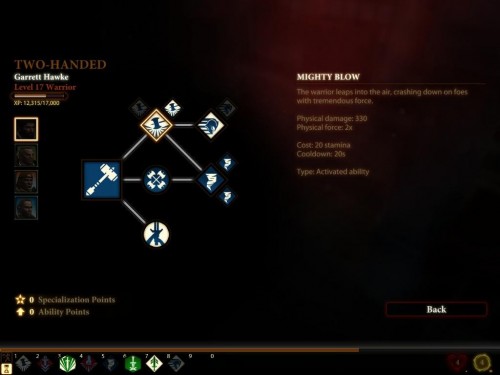
Two-handed weapon skill tree.
Overall, you have a lot more supportive abilities to choose from but they are poorly balanced and some abilities are superior to others. For example, Blood Frenzy – a PASSIVE ability that increases the damage as your health goes down, up to 200% is clearly a must have skill for warriors, especially since it has no skill requirements and you don’t have to invest a lot of points to get it, whereas Berserk – a SUSTAINED (can have only one sustained ability active) ability that adds 10% of the remaining stamina damage (a warrior will run out of stamina FAST) is all but useless.
Eventually, probably by the time you hit level 14-16 you’ll build a fairly capable character with most or all skills you want to have. Then you’ll have no reasons to look forward to the next level up, which is one of the three main elements of action RPGs, and start losing interest. If you’re wondering why, imagine Diablo 2 without the ability to invest multiple points and with poorly designed and balanced skills.
Mortal Combat
Ironically, given its focus, combat is a weak, uninspired aspect of the game, a fact which dooms Dragon Age 2 to mediocrity and abysmally low ratings. Simply put, the combat lacks personality and variety. You'll quickly become bored of the simple, predictable two-waves-of-enemies combat design. This combat is at its best in Act 1, when every new skill makes a difference and the enemies’ HP are still relatively low. Which means that it is tactics and not patience which is needed to kill them. Sadly, that doesn’t last very long.
There are 4 combat modes: Casual – for people who want to click on things and watch them explode; Normal – for people who don’t mind clicking on things a few more times before they explode, Hard – enemies have enough HP and armor to force you to pay attention to what you’re doing, and the aptly called Nightmare – friendly fire is on, so watch where you cast spells and where you swing that sword. Basically if you like micromanaging a party using awful, unresponsive controls, this mode is for you.
Turned out when Mike Laidlaw talked about exploding enemies he was speaking literally.
The game is challenging on Hard (though it would have been nice if friendly fire had been enabled there too), but the challenge comes not from the ruleset as it does in Dungeon & Dragons games and not from well-designed monsters with a variety of abilities as it does in Diablo-like games, no, it comes from the sheer numbers of enemies zerging your party and from that second wave of enemies spawning in all around you, literally out of thin air in most cases, which is the laziest design possible.
The simplistic encounter design is rarely deviated from. First, you fight the first wave; it’s fairly weak and doesn’t present much challenge. Then the reinforcements (the second wave) start parachuting or warping in. They have more HP, better armor (so it will take you a lot longer to kill them, which greatly increases their chance to overrun and kill you), and often include tougher monsters.
Level scaling once again proves to be an abomination and a slight against God, ruining both combat and the item system. Every time you level up, you actually get weaker. Your “to hit chance” and armor rating go down (because enemies’ to hit chance and armor rating go up), which is absolutely retarded. So, your equipment, including unique items, lose their value faster than you can blink, and priceless artefacts of yesterday are quickly surpassed by the local mass production. If you want to maintain your combat worthiness you have to hit the shops after a level up or two and buy (often the same looking) weapons/armor with a 5-7% increase in stats. I call it the hamster wheel design.
Speaking of items, the damage resistance and armor penetration stats have been discarded (not very welcoming?), and you can often find daggers that do as much damage as your two-handed sword, but you can’t equip them because you’re playing a warrior and warriors, like, never fight with daggers (or bows) because it’s, like, beneath them or something. Overall, it’s hard to describe the item system – another major aspect of action RPGs – as anything other than “utter shit”.
Speaking of items, Kirkwall and its surroundings are filled with junk you can pick up. It goes into the generic “loot” section of your inventory; the loot doesn’t have icons and is aimed to make you wondering what this loot business was all about. “Are the designers lazy?” “Couldn’t they afford to pay a concept artist a few thousand bucks for some decent icons?” “Do we even need this junk?” “Wouldn’t it be better to give the player some interesting items showing the world’s history and culture?”
It’s mind boggling that people who want to design an action RPG wouldn’t try to analyze and understand what made Diablo 2 so successful. Then again, in all fairness, Blizzard spent 4 years on Diablo 2. It is as if the industry is convinced that there are two equally legitimate ways to make mega-selling action RPGs: either by spending years and tons of money tweaking the mechanics until they form a cycle of continuous, addictive gameplay or by throwing something together in a year, making sure there are lots of monsters to kill and then calling it a night and going for cocktails. Click a button = monster explodes, that's all there is to it, right? How hard could it be?
I stopped playing the game when I started Act 3. My patience was overcome by a dragon. It was a fearsome beast, full of vigour and hit points. Borrowing a page from console boss fights, he would fly to a remote rock every time I’d get his HP down by a quarter (which takes like 5 minutes real time) and summon some chicken-dragon trash mobs while shooting exploding projectiles at my party. Somewhere between sitting and watching my characters slowly – ever so very slowly – chipping away at the dragon’s health bar and keeping an eye on the cool down counters, I asked myself what part of this tedious exercise constitutes fun and couldn’t really come up with a good answer.
I remember fighting Firkraag, the red dragon in Baldur’s Gate 2. Now THAT was fun. The dragon didn’t have a health bar. It had only 180 hit points. There were no cool downs. Now, I know what you're thinking.
"But, without cooldowns, how would I know when to click my buttons?"
We called them tactics, son. And the sword you got after the fight didn’t become obsolete the moment you leveled up.
Good times, good times.
Quests and Role-Playing
Dragon Age 2 quests are painfully straight-forward “kill ‘em all” fare. Locate a group of bad people/monsters on your map and kill them all, sometimes after a brief conversation. Every now and then you’re presented with a choice – should you kill an NPC or should you let the poor bastard live. Sometimes there are consequences, usually, these involve getting more quests if you do exactly as asked. This approach would have worked well in a proper RPG, but in an action RPG like Dragon Age 2 there is no shortage of quests (since they all amount to placing the same old monsters in the same old caves/dungeons and sending you there) and in the end it hardly matters whom you kill.
The focus on combat keeps you from getting immersed in the setting/story as you never feel that you’re actually a part of the gameworld, you never get to dig too deeply into the setting and characters or feel that your decisions matter, that you’re anything other than a killing machine, no different from the dwarven stone golems. Your purpose is to kill and every now and then you’re allowed to spare someone’s life for some inexplicable purpose.
The game has a lot of passive options, but much like the options related to your sister, they amount to pretty much the same thing. Sure, it’s a neat option to have a party member who can save her from dying, but the outcome is the same for all 3 options – she’s gone for good. The usual Bioware 'flavour' choices.
Another example is the ending of Act 2. There is a bunch of Qunari (a race of warriors) in Kirkwall. They sit there and do nothing, every human nervously wondering what they are waiting for. Turns out they are waiting for you to finish running errands for everyone in Kirkwall. When you do, the story takes another jarring turn and suddenly the Qunari attack the city. Being a helpful sort, you fight your way through the city through to the palace. But then, hooray, you get a choice!
The Qunari are looking for a relic, see. The same relic that Isabella, the token slut party member, was looking for. So IF you recruited her and IF you agreed to help her (in which case she always grabs the relic and runs), and IF you were nice to her, THEN she comes back and hands over the relic. Arishok, the Qunari leader, demands that you hand over the thief. If you agree, they leave peacefully (after torching the city and killing the local ruler). If you don’t agree, of course, you fight.
You can fight Arishok one on one or you can fight him and his entire entourage. Not much of a choice as fighting him and his entourage is more interesting and challenging, but let’s say you want to do the duel. There are two ways to get the duel – either by doing a quest for Arishok earlier (again, I don’t see a reason why you wouldn’t; it’s an action RPG, when someone asks you to look into some matters, aka kill some people, you go and kill some people because that’s all you do in such games) or by having a certain party member in your party who knows the Qunari code and can invoke your right to single combat.
Seemingly, there are a lot of options here, but the execution is deeply flawed.
Firstly, it would be great if you could go and get the relic for Arishok before he attacks the city. It could have been an interesting quest requiring completion of several other quests and rewarding you for playing a certain character type. In the absence of this option, no matter what you do, no matter how much you do for Arishok, he still attacks, reminding that you’re playing an action RPG.
Secondly, it would be nice if you could just hand over the relic when Isabella brings it back. The insistence that you hand her over as well ruins the option. Only a psychopath would hand over a person who came back to help them when she didn't have to. You’re a warrior of great renown, you aren't bargaining from a weak position, especially after they attacked the city and killed the ruling nobles. You can just kill the fuckers and be done with it, if you choose. If you were given a chance to trade the viscount’s life for Isabella’s or if you were playing a shrewd diplomat who couldn’t hope to best the Qunari in combat and had to cut a deal, that would have been a different story. Otherwise…
Thirdly, why would you even want to avoid fighting him in a game where all you do is fight? It’s like reaching Mephisto in Diablo 2 and getting an option to avoid the fight by giving him a trinket, saying “we cool, bro?” and passing through. Same goes for fighting Arishok and his entourage, which like I said, is one of the more interesting and challenging fights in the game.
So, as you can see, there are a lot of options but the combat-centric nature of the game works against them, rendering most of them meaningless.
Exploration
Exploration is so awful that it deserves its own chapter. While Kirkwall is a great looking, atmospheric city, the rest – the coast, caves, and dungeons can easily compete for the apparently much-coveted worst designed award.
There are two issues. The first, I assume, has something to do with the consoles. All game environments are small passages. Even the coast is represented by a large, circle 'passage'. The game’s characters do their best not to notice it, but it makes the problem even more noticeable.
At least you can't possibly get lost.
The expedition to the Deep Roads (a network of ancient underground roads once connecting the dwarven cities) is nothing but 3 small “dungeons” between the cutscenes. The first cutscene tells you that the road is blocked and asks you to check the side tunnels. The map shows you a small square of your current location and a single path to the side, which significantly narrows down your “side tunnels” exploring options. You run through the tunnel killing things in your way until you reach the end, which triggers another cutscene informing you that the exit to the main road has been found. Huzzah!The Deep Roads side tunnels in all their glory.
You don’t actually travel the Deep Roads because the consoles would probably explode. Instead you’re teleported to the next tiny passage. You’ve found something again! The stuff of legends. The Primeval Thaig, whatever that is. How did you find it? Damned if you know. You were napping most of the time and when you woke up, there it was, in all its ancient glory. Fighting your way through narrow, linear passages you reach the main chamber. Cutscene! The evil brother grabs a relic and locks you inside a chamber buried deep underground. What are we going to do? Hmm, maybe we should take this linear passage that conveniently runs all the way to the surface? I know it sounds crazy, but it just might work.Overall, the design of the Deep Roads, especially considering what they are supposed to be, can’t be compared to the wondrous, awe-inspiring dungeons of Baldur’s Gate 2’s or Icewind Dale.
The other problem, the one most shouted about in the mainstream media, is that most of the caves and dungeons are reused. When I heard about it, I foolishly assumed that Bioware reused certain parts and every now and then you'd see a room you’d seen somewhere before. No. No, no, no. They reused the entire thing. You’ll be seeing the same cave and dungeon over, and over, and over again. Anyone who can say they genuinely thought this was a good idea, with a straight face, well, I'll let you be the judge of their motives.
Exploration, that feeling of entering a new area and marvelling at the design, of discovering hidden passages and wondering where they lead, of turning a corner and encountering something surprising, is an important aspect of RPG design that keeps the player going when everything else starts to fade into familiarity. We all know that the genre must be pushed forward toward the Light, but designing a game with a single cave and a single dungeon is evolving the genre a bit too fast, players might get a little dizzy with all that exciting innovation, all at once.
And in Conclusion
Dragon Age 2 is a mediocre and deeply flawed action RPG, rushed out to earn EA a quick buck and betting on Bioware's reputation to pull up the sales. Even though the setting and the events are interesting, and the various options show potential, the overwhelming focus on killing things keeps you from digging into the world and its characters in a satisfying manner, and cripple replayability. Unfortunately, the combat is too repetitive to carry the game on its own. It's bad enough that even the mainstream reporters have noticed, though they are generally quick to make excuses.
I certainly hope that someone, somewhere has learned a valuable lesson.
EA Superior: What did we learn, Laidlaw?
Mike Laidlaw: I don't know, sir.
EA Superior: I don't fuckin' know either. I guess we learned not to do it again.
Mike Laidlaw: Yes, sir.
EA Superior: I'm fucked if I know what we did.
Mike Laidlaw: Yes, sir, it's, uh, hard to say.
EA Superior: Jesus Fucking Christ.





